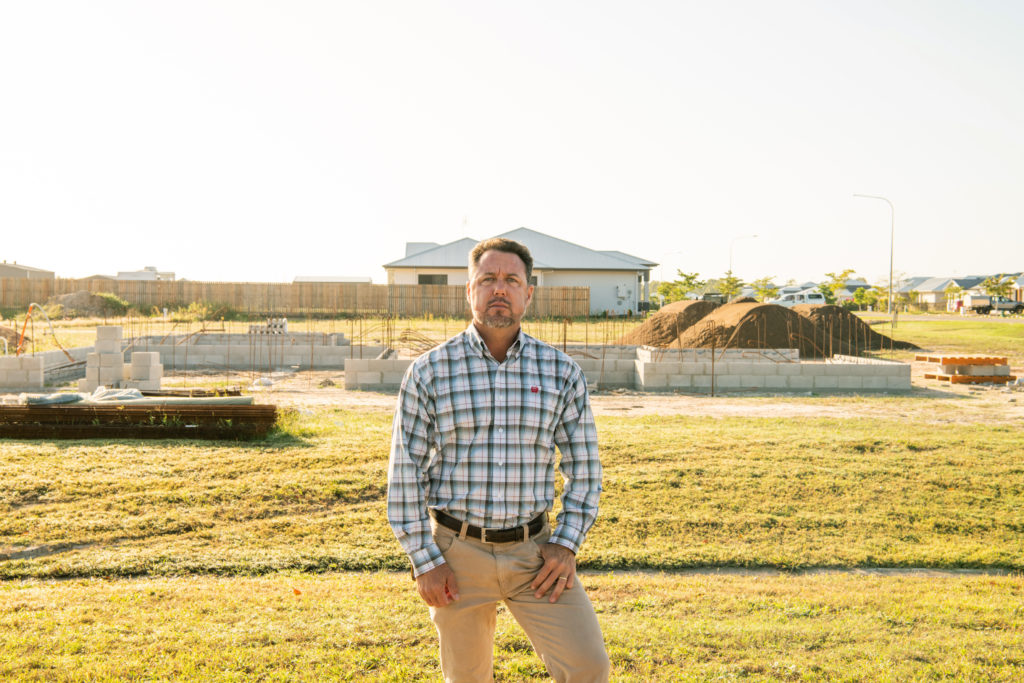New Construction Code a barrier to housing affordability: Dametto

State Member for Hinchinbrook and KAP Deputy Leader, Nick Dametto.
With the Queensland Premier announcing she will chair a ‘landmark’ summit to address the state’s housing crisis, Deputy Leader of the Katter’s Australian Party and Hinchinbrook MP, Nick Dametto has set his sights on the Palaszczuk Government’s adoption of the National Construction Code, saying the Government must suspend changes due to come into play in October next year if they wanted to address long term housing affordability.
The Hinchinbrook MP believes the new requirements will drive up construction costs of new homes by up to $30,000, making it harder for people to break into the housing market.
From October 2023, the amendments to the National Construction Code will require every new home to have at least one step-free entry, wider internal doors and corridors, a larger toilet on ground (or entry) level and a step-free shower.
New homes and apartments will also need to achieve an increased energy efficiency rating, moving from a six to seven star standard. This will mean Queensland homes need more insulation, more expensive windows and more expensive household appliances to save the home owner just $790 a year on their energy bills.[1]
Mr Dametto said Public Works Minister, Michael de Brenni’s willingness to adopt new higher construction standards while housing affordability was worse than ever, highlighted just how out of touch the Palaszczuk Government was with pressing issues affecting everyday Queenslanders.
“While I support improving housing accessibility for the disabled, the fact the Government is adopting measures which will openly add at least $30,000 to a new build in a time when Queenslanders are living on the streets or in tents, cars and caravan parks, is not going to help anything,” Mr Dametto said.
“When everyday Queenslanders are struggling to keep up with cost-of-living pressures and break into the housing market, the Government is set to implement the most substantial change to the Construction Code in 25 years.
“These changes are coming at the wrong time and will push the industry to a grinding halt at a time when customers are seeing interest rates rising and on the back of the COVID related price rises.
“The fact that New South Wales, Western Australia and South Australia had opted out[2] of the new minimum accessibility standards highlight that these changes will drive up prices and place an unjustified burden on the construction industry.”
Peter Fry, HIA North Qld Executive Director said the significant changes would affect every person associated with the building industry.
“It’s not just those that work on site, but also engineers, architects, certifiers, town planners, developers and so on, and who is going to educate the consumers,” Mr Fry said.
“The changes have wide ranging ramifications requiring standard house plans to be re-drawn and costed, new display homes to be built, land developers will need to review all existing approvals as well as future plans and all this has to occur within 12 months,” Mr Fry said.
“Everyone has just 12 months to learn and gain an understanding of the consequences, with many existing display homes to become non-compliant.
“To impose this level of change on an industry that has battled to survive over the last two years is unthinkable.
“While some may say the industry has known these changes were coming, the truth is the final details for accessibility were only released in May this year, while the energy changes were only released on 1 September.”
Mr Dametto said if the Government weren’t going to reverse the mandatory changes, then the Minister needed to work with the building industry rather than against homeowners and builders.
“The Government needs to be real when it comes to the scale of these changes. Those in the industry still don’t fully understand what the changes will entail or who will sign off exemptions where allowed, with just over 12 months for industry adoption,” he said.
“We need to be making it easier for people to get into their first home, not throwing up roadblock after roadblock, while forcing an industry to its knees.
“While the Premier has finally conceded she will chair a housing summit, these new changes must be addressed first and foremost if we’re going to have a conversation about housing affordability.”
—ENDS—
[1] https://abcb.gov.au/sites/default/files/resources/2022/Energy%20Efficiency%202022%20Decision%20RIS%20Publication%20version%20%28359067.2%29.pdf pg xix Option 1, QLD Class 1 dwellings
[2] https://www.abc.net.au/news/2022-08-23/australian-houses-might-need-a-total-redesign/101360316





